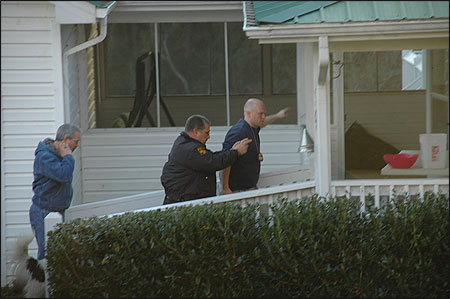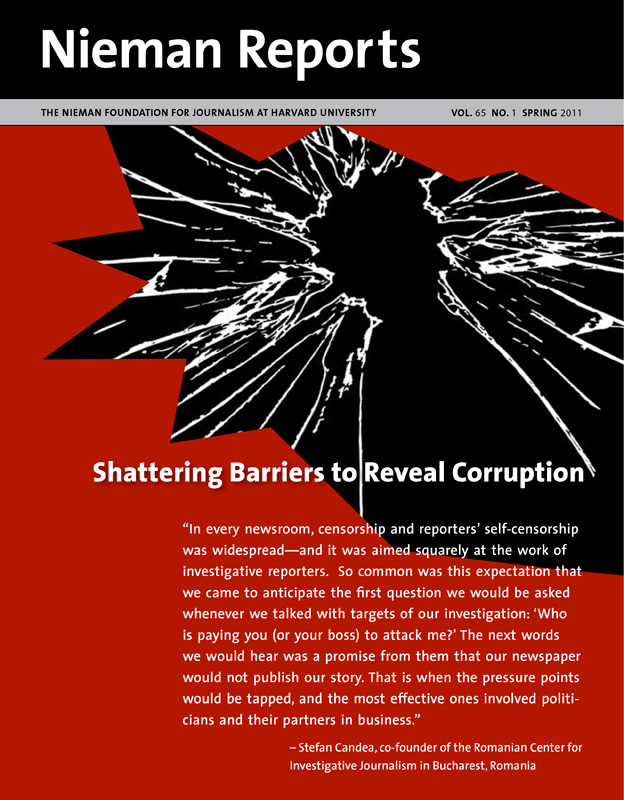
The indictment of Sheriff Hodge, in handcuffs, on 21 counts of abuse of public trust and evidence tampering came after a investigation by the Times-Tribune in Corbin, Kentucky. Photo courtesy of the Times-Tribune.
I went to Bud's Gun Shop to pick out a pistol because, quite frankly, I thought my reporting might get me killed. It was January 2010, and for the past month, the newspaper I worked for, the Times-Tribune in Corbin, Kentucky, had been running an investigative series on evidence and money missing from and a lack of prosecutions by the Whitley County Sheriff's Department.
Anyone who knew then-Sheriff Lawrence Hodge and the recent history of Whitley County would know this purchase wasn't an overreaction. Since I had moved to Corbin to edit the paper in August 2006, I had seen cops and elected officials arrested on charges related to drugs, vote buying, the theft of public funds, and violent retaliation. It is not unexpected that a political term ends in an arrest.
When I bought the gun, I was thinking about the 2007 murder of the recently fired road supervisor in adjoining Laurel County. In the days before his death, he told me things were "not right" in the department, and several sources said he was ready to start talking. But before I got a chance to interview him, he was shot through a window at his house and killed.
No one was ever charged.
That sort of thing happens around there. And for a while after we started reporting on Hodge, I wouldn't sleep near a window.

Discovering Danger
Our investigation into the sheriff started with a joke—literally. I heard our sportswriter joke about people buying guns out of the back of the sheriff's barbershop. (It's a county of about 38,000, and the sheriff worked as a barber.) On a whim, I sent an open records request to view the sheriff's evidence logs. He refused to show them to me but after an appeal to the state attorney general, I got them. I found there were months when nothing—guns, drugs or money—was recorded. That was quite unusual, considering we had a drug-related arrest story in nearly every edition of our 6,000-circulation daily.
At best, this was shoddy record-keeping. At worst, perhaps he really was selling guns from the back of his barbershop.
But I was running an understaffed newsroom of two reporters and accusing the sheriff of stealing guns and drugs was not something to print lightly. We needed deep research and multiple sources. I went through three reporters before I found one with a nose both skilled and hard.
Adam Sulfridge, a Whitley County native, was a 20-year-old college student when he started as a part-time writer in the summer of 2009. Over several months, he dug through thousands of handwritten arrest citations to determine what evidence should have been in the sheriff's custody. Since he was a local boy, people trusted him. As word spread about what we were doing, courthouse workers began discreetly slipping him scraps of paper listing case numbers worth investigating.
We found that guns that should have been in the sheriff's custody weren't. Our big break came after we sent a records request about the whereabouts of 18 particular guns. Days later, before we received a reply, the sheriff's office was "broken into" and Hodge claimed 78 guns (including the ones we asked about), drug evidence, and paperwork were stolen.
It certainly seemed convenient.
The next day the Bureau of Alcohol, Tobacco, Firearms and Explosives contacted Adam and me as it began an investigation into the department. We kept digging, fueled by tips from citizens and readers. We found that drug evidence wasn't being submitted to the crime lab for testing and was nowhere to be found. State audits revealed that hundreds of thousands of dollars were missing from the department.
The sheriff's department retaliated by refusing to give the Times-Tribune information on even basic traffic accidents. Instead, the department fed stories to a competing weekly newspaper—a tactic that backfired. The community was in an uproar after we reported that charges were dismissed against a man arrested for operating a methamphetamine lab near an elementary school because deputies failed three times to present evidence before the grand jury. We might have missed that case if the sheriff hadn't bragged about the arrest in the other paper and posed for a photo with the evidence.
I wasn't totally surprised when federal investigators told Adam that the sheriff had made comments about "taking care of" him. He was known to have a temper and had told Adam to "go fuck himself" after the break-in. The sheriff wasn't charged for his alleged threats, but we were advised by investigators to stay within the city limits where deputies had jurisdiction but rarely patrolled and not to let a deputy pull us over.
Everywhere I went friends, attorneys and even my optometrist warned me to be careful, but I didn't get spooked until a State Police trooper came to my office one day just to say I was doing a "brave thing." City cops started telling me the same thing. And that's about the time I went out to buy a pistol.
Only once did either Adam or I use a gun in any way. A man we suspected as part of a group of drug dealers associated with the sheriff drove up to Adam's house on a dead-end street when Adam was standing outside. His passenger walked silently toward Adam. When Adam flashed a pistol, the men claimed to be looking for scrap metal and drove away. That driver was arrested a week later on a 10-count federal indictment for distributing cocaine and painkillers.
The Arrest and Its Aftermath
On May 20, 2010, days after Hodge lost a hotly contested primary election, a petition was filed to impanel a special grand jury to investigate his department. The Times-Tribune's reporting and "numerous citizen complaints" were cited as the reasons. On November 8, 2010, the sheriff was indicted and arrested on 21 counts of abuse of public trust and evidence tampering. Additional federal charges are pending.
By the time of his arrest, I had already left Kentucky for a community newspaper job in a town along the coast of Oregon. Adam stayed in the area, but he had quit the Times-Tribune and lived in an out-of-town hotel during the weeks the grand jury was meeting. He said he couldn't continue to report and avoid the sheriff and his deputies.
While I never doubted the accuracy of our sources, I was relieved when that arrest finally came. I wanted vindication in the community. Most readers appreciated our coverage, but we weren't without critics. The weekly paper and several anonymous bloggers accused me of trying to influence an election, harboring a personal vendetta, and tampering with a police investigation.
I knew we'd get a backlash for our reporting, which was far more aggressive than most small-town papers are willing to stomach. But the news media's role as watchdog is vital in communities with a long-standing culture of corruption. Everyone seemed to know something wasn't right. But nobody—not even the federal authorities until we started pushing the issue—was willing to do anything about it. Allen Trimble, who is the commonwealth's attorney for the state's 34th Judicial Circuit (which oversees Whitley County), told The Rural Blog, published by the Institute for Rural Journalism and Community Issues, that our "very persistent" reporting "was a very significant influence on me."
Hearing him say this was both amazing and a little bit sad. It tells me that there is a great need for good investigative journalism in rural America. Young reporters tend to think they need a byline from The New York Times to make a difference in the world. If they really want to have an impact, get a job with a community paper, and start asking the tough questions that no one ever asked before.
Samantha Swindler was managing editor of the Times-Tribune in Corbin, Kentucky for four years. In July 2010, she moved to Oregon and is now publisher of the Tillamook Headlight-Herald.



